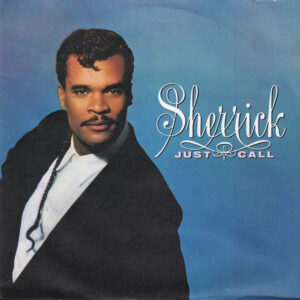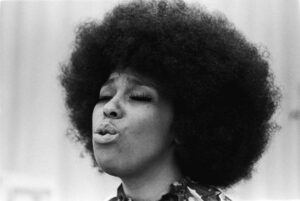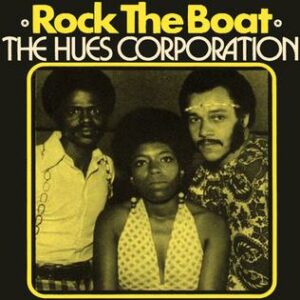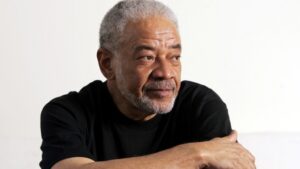 Thelma Jones defines soul as, "The ability to take your life experiences, or what you feel, and be able to absolutely touch people’s hearts with that." From the early 1960s when she held court at The Apollo to recent engagements with The O’Jays and Millie Jackson, Thelma Jones has been giving audiences that very quality. The U.K.-based Kent label recently assembled a solid compendium of her career on Second Chance (2007), grouping together her sides on the Barry (1967-1968) and Columbia (1976-78) labels. The collection is an essential introduction for new listeners and reminds longtime fans why Big Maybelle once called Thelma Jones, "That little bitty baby girl with that big ole voice."
Thelma Jones defines soul as, "The ability to take your life experiences, or what you feel, and be able to absolutely touch people’s hearts with that." From the early 1960s when she held court at The Apollo to recent engagements with The O’Jays and Millie Jackson, Thelma Jones has been giving audiences that very quality. The U.K.-based Kent label recently assembled a solid compendium of her career on Second Chance (2007), grouping together her sides on the Barry (1967-1968) and Columbia (1976-78) labels. The collection is an essential introduction for new listeners and reminds longtime fans why Big Maybelle once called Thelma Jones, "That little bitty baby girl with that big ole voice."
Hailing from Fayetteville, North Carolina, Thelma Jones was raised when the south was still largely segregated. "Everybody sort of stayed in their own little niche and it was very confining," she recalls. "In terms of the political situation, it was unpleasant because you’re totally aware of it. Even if you’re a little person, you’re taught very early on that ‘This is what you do, this is what you don’t do’ in order to remain safe." Despite racial tension, Jones says, there was a strong sense of extended family in the community, with everyone looking out for one another. It was in this environment that little Thelma began cultivating her vocal talent, though she didn’t consider herself to be particularly unique. She explains, "I don’t remember a time when I was not singing. It was always there. Because I didn’t formally study music, I guess I didn’t recognize that there was anything unusual about just opening your mouth and being able to sing because everybody around me could sing."
A wealth of professional riches awaited Thelma Jones when she moved to New York City with her family. With a background steeped in gospel, Jones and her siblings formed a group called The McDaniels Singers and was even pursued by the manager of Frankie Lymon & the Teenagers at one point. Encouraged by her sister, Jones performed solo at The Apollo’s "Amateur Night," where she met her future husband and manager, James Hazley. So taken was Hazley by the magnetism of Jones’ stage presence that he mapped out a recording career for her. Soon enough, he brought Jones further into the world of secular music, arranging opening slots for Arthur Prysock and a very young Kool & the Gang.
Initially, the gospel community was not at all pleased with Jones’ new direction. "They would have preferred that I continued with gospel music because I guess they felt that that was a gift that God gave me and that was the way I should use it." She had often appeared on TV Gospel Time with Reverend James Cleveland and worked with the Clara Ward Singers. The bishop of the church she attended groomed her to become the next Mahalia Jackson. "When he passed away, I became sort of disillusioned with the whole church scene," Jones explains. "I wasn’t fond of the ‘fire and brimstone’ scene. I always felt like God was love – that was what we were taught. All the fear — ‘If you don’t do it this way then you’re going to hell’ — just the way it was presented, I became a little disillusioned with it and I was seeking, searching for another definition that reflected that love a little more."
Through Hazley’s friendship with Hy Weiss, Thelma Jones was signed to Barry Records. Robert Banks wrote and produced her first sides for the label, "Never Leave Me" and "Gotta Find a Way." Jones cites the latter, with its simple yet dramatic chorus, as her all-time favorite among her recordings. She explains, "It was kind of like a personal testimony because I was always kind of shy and sort of insecure – at least in those days," she laughs, continuing, "Once you’ve been hurt, you’re kind of reluctant to get back involved and trust someone again. I just love the lyrics: ‘I’ve gotta find a way to get to your heart/ I know you’ve been hurt before/and how much your heart’s been torn apart.’ That just appealed to me. I loved the melody and the structure of the song."
As Jones’ became an in-demand performer, she found support in the late great gospel/R&B performer Big Maybelle as they worked many of the same shows together. "She was the headliner and she was just so gracious, kind, and open-hearted. She didn’t have that ‘diva’ deal. She was just really sweet. She took me to her dressmaker where she had her clothes designed and sort of took me under her wing and tried to help me. I was just impressed because she took the time out of her life to be that kind to someone who was just starting out. I never once got a sense of competitiveness. The lady was so talented and so gifted, just so soulful." To this day, Thelma Jones includes a tribute to her sorely missed mentor in her show.
While Jones continued to perform throughout the late-‘60s, the "Never Leave Me" single eventually caught the attention of one of the biggest R&B-oriented record labels at the time, Atlantic. Label executive Jerry Wexler sought a signing with Jones and sent her down to Muscle Shoals to record tracks with producer Bobby Lance. An unresolved dispute between Lance and Jones’ husband prematurely ended the Muscle Shoals sessions. Even though the ink was still fresh on the contract, Jones was released from Atlantic.
The early ‘70s found Thelma Jones without a record deal and performing at small clubs and places like the Holiday Inn. Fate intervened when George Chavous, one of the top promotion men at Epic Records, brought CBS Records executive Mickey Eichner down to see Jones’ show at a club in Miami Beach. Before Jones knew it, she was back in Muscle Shoals, this time working with Brad Shapiro, who was known for his work with Joe Simon, Millie Jackson, and Wilson Pickett. The session produced the song that landed Jones an album deal with Columbia, "Salty Tears." The single garnered much airplay upon its release in 1976 and became Jones’ signature song. About the classic, she says, "I think it touched that core the same way ‘Gotta Find a Way’ touched me. I think I was blessed to be able to translate that lyric and the story behind it so that it touched other people. I think most people, if they’re honest, have been through regrets and lost love."
With "Salty Tears" on the airwaves, Bert DeCoteaux was enlisted to produce Thelma Jones’ first full-length album, Thelma Jones (1978). Released more than ten years after "Never Leave Me," the music on her eponymous debut reflected a sophisticated fusion of pop and soul, including covers of "I Second That Emotion," "Angel of the Morning," and "Now That We Found Love." Whereas Jones had been categorized in a "certain little box" with her Barry singles, Columbia primed her for a larger listening audience. "I had reached a level where I could choose songs and bring my own interpretation to the song," she recalls about the experience of recording the album. "I think it had more crossover potential. I remember at that time…people wanted you to sound just like Roberta Flack or just like whatever the hit was of the day. I tried. I never could do it so what I settled upon doing was learn the song, stay true to the lyrics, stay true to the melody but then do it the way that I felt about the song. I think by the time I got to Columbia, I had reached that stage. I had matured a bit."
Commercial success, however, was short-lived. Conflicts between management and the label ensued when it came time to determine who would produce the follow-up album. The heated disagreements hindered any notion of Jones continuing a relationship with Columbia. She divorced James Hazley, which also left her without a manager, and walked away from the recording industry, two decisions that took their toll. She recalls, "It was my choice. I’m not saying, ‘Woe is me.’ I consciously made an adult decision to go that way and after that, I never really connected again with management and agents and all of that. You can do it on your own. People call you and you can work but that’s part of the business: to have representation."
Even without a record deal, Thelma Jones never stopped singing and her fanbase continued to grow. Friends and industry peers regularly invited her to sing at high-profile events and charity concerts. One of the more memorable gigs was her performance at the Minority AIDS Project benefit. The concert paid tribute to Phyllis Hyman, with whom Jones had been acquainted back in the mid-‘70s when both artists played the same rooms in New York. Jones brought the house down with her versions of "I Got It Bad and That Ain’t Good" and "Here’s That Rainy Day," revealing the jazzier side of her repertoire.
The blues was the backdrop for Law of Old, an album Thelma Jones released in 2002 that highlighted yet another facet of her musical gifts. Having worked with many blues greats throughout her career, including B.B. King and Little Milton, the album was a sincere reflection of her background. Though Law of Old didn’t have the best distribution, Jones still performs material from the album in shows, specifically "Saved By the Blues."
In the midst of her fifth decade of recording, Thelma Jones has definite ideas about what kind of album she’d like to produce next. She recounts how a conversation with David Nathan inspired her about what style she’d explore in the future: "He said, ‘If you had the opportunity to choose and there were no obstacles in the way, nothing standing in the way of you doing the best CD that you could possibly do, which direction would you go in?’ After I thought about it I said, ‘You know what I would love to do at this point? A straight-ahead, authentic rhythm and blues CD.’ Ruth Brown said to me, ‘You can’t give up this rhythm and blues music. Too much blood has been shed for this music. You are one of the few people that’s still here that lived through the music. You’re an authentic R&B singer. You know the music. You’re not copying somebody. Maybelle wouldn’t want you to give it up either.’ Then she passed away of course, but I thought, ‘She’s absolutely right. That’s what I want to do.’" With the resurgence of interest in artists like Bettye LaVette, Solomon Burke, Mavis Staples, and Sam Moore over the past few years, Thelma Jones is perfectly poised to update the sound that won her fans the world over back in the 1960s.
Her recent appearance at Sunset Junction in Los Angeles under the music direction of Arthur Adams ("a genuine, sweet person") exemplifies her feelings about live performance and what she hopes audiences derive from the experience. "What I’d like for you to see is a connection with you because I like to connect with the people. They take time out of their lives, which you absolutely cannot replace, and they come to see you. I like to perform to people as though I were in the audience. I like the people to look at me, to speak to me, make eye contact. The main thing that I like for people to take away is a sense of hope and being uplifted without being preached to. I come from a gospel background, and that has its place, but people have all kinds of spiritual beliefs and it’s personal. If they’re touched or they feel connected, then they can take that in the direction they want to go in."
Thelma Jones discovered just how vociferous her U.K.-based fans are when she performed at the Northern Soul convention a few years ago. The enthusiastic response led to her first time ever performance in England in May 2007, an effort spearheaded by longtime fan and biographer David Nathan. She took the occasion to dust off the beloved Barry classics: "Uh Oh Here Comes the Heartbreak," "Stronger," "The House That Jack Built" (she recorded it before Aretha Franklin), and "Gotta Find a Way." Forty years after the release of "Never Leave Me," it was as if Thelma Jones had come full circle. "I was totally overwhelmed and really struck with profound humility that people would love the music and keep (me) in their hearts all those years. That was really an amazing spiritual experience. It translates into love that people would hold your music and what you tried to share all those years in your heart. All I could say to them is good things come to those who wait."
Soul never knew truer words.
By Christian John Wikane









